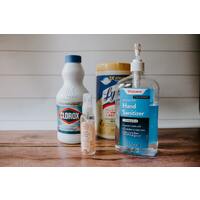When Do Cleaning Products Expire
Date Posted:27 October 2022

If you don't deep clean as frequently as you'd like, you may find yourself holding onto certain products for months (or, in some cases, years) after their expiration dates have passed. While this may not be as concerning for products that clean rarely-used surfaces (such as window sprays), storing disinfectants that have passed their expiration date can be hazardous, especially during a global health crisis or cold and flu season.
Checking the Expiration Dates
First and foremost, cleaning products can and do expire. The expiration date of your products should be printed on the package, usually near the label or on the lid or bottom. The freshness of a product is determined by the ingredients it contains, any preservatives added, and whether or not the container has been opened.
Expired surface cleaning sprays and dishwashing liquids won't harm the surfaces they're meant to clean, but they won't clean as well. To achieve the same results, you may need to use a little more product or clean for a little longer.
However, disinfectants and hand sanitizers must be used within their shelf life in order to have the desired effect. Check disinfectants and hand sanitizers for expiration dates and replace them as needed.
Does bleach expire?
It may come as a surprise that bleach has such a short shelf life. Household bleach is sodium hypochlorite mixed with other ingredients such as salt, washing soda, and lye. This results in an unstable mixture that does not want to remain in its bleach form for long. When exposed to air, the chlorine gas begins to evaporate, and the bleach degrades into salt and sodium chlorate. Because sodium chlorate dissolves in water, bleach eventually degrades into a saltwater mixture.
Bleach degrades at a rate of around 20% per year. That means bleach has lost about 10% of its effectiveness after six months of use. You can continue to use bleach after six months, but it will become less effective over time. Because most people use bleach to disinfect surfaces, they may believe they are better protected against pathogens and bacteria than they are.
When do disinfectants expire?
The expiration dates of disinfectants vary depending on the active ingredients contained within them. Antibacterial disinfectants have a much shorter shelf life than all-purpose sprays. Part of the reason for this is that all cleaning products degrade over time. While some antibacterial effects may persist after a product has expired, they are insufficient to qualify it as truly antibacterial.
Because we can't see microbes on surfaces, we must rely on the products we use to kill them. Expiration dates contribute to this trust. When a cleaning product expires, it does not mean it is unsafe or ineffective. It means it will not perform to the level expected by the consumer. When it comes to killing viruses and bacteria, the user must be aware of this information.
Can expired disinfectant still be used?
Cleaning products that have expired are simply less effective versions of brand new ones. You can still use expired products, and they will not harm you, but they will not produce the best results. This could indicate that your dish or laundry soap does not foam as well as you expected. It could also mean that your kitchen hasn't been sanitized, even if you thought it had.
The fragrance in products frequently degrades over time. That could imply that your dryer sheets are still reducing static and making your clothes feel nice, but they don't smell as good as you expected. The absence of scent in a product can also indicate that it has expired. If your kitchen cleaner doesn't have the expected lemony scent, it's probably past its prime.
Lifespan of Common Cleaning Agents
- Laundry Detergent: Store liquid and powder detergent in a cool, dry place for 6 months to a year after opening. Some laundry detergents, such as All, have the date of manufacture stamped on the cap or bottle to assist you in keeping track of storage time. Using detergent that has passed its expiration date may not get your clothes as clean as new detergent.
- Oxi Clean Powder: To maintain the product's unlimited shelf life, the powder must be kept dry and in a cool place.
- Hand sanitizer: Hand sanitizer has a shelf life of two to three years before the alcohol content drops below 60%, rendering it ineffective. If you can't find soap and water nearby, the Centers for Disease Control and Prevention (CDC) recommends "using a hand sanitizer with at least 60% alcohol can help you avoid getting sick and spreading germs to others." Make sure you're using hand sanitizer correctly. These are the 13 times you've used too much hand sanitizer.
- Fabric Softener: Fabric softener, whether liquid, dryer sheet, or dryer bar, keeps its softening power for about a year.
- Multi-Surface Cleaners: These multi-purpose household cleaners have a shelf life of up to two years. They may have a one-year shelf life if they contain antibacterial ingredients.
- Lysol Disinfectant: The disinfectant spray and wipes may lose some of their effectiveness after two years. If you continue to use the product after this time, the fragrance will most likely fade.
- Hand Dishwashing Soap: If you like to stock up on dish soap when it's on sale, only buy enough to last 12 to 18 months. Buy no more automatic dishwashing detergent than you will use in three months.
Bottomline
To keep track of your cleaning supplies, write the date on the label as soon as you get them home from the store. No matter how recently you purchased them, any cleaners that have separated, clumped, or become lumpy, or have an off odor, should be discarded. For the safest way to dispose of cleaning products, consult the American Cleaning Institute's website.

